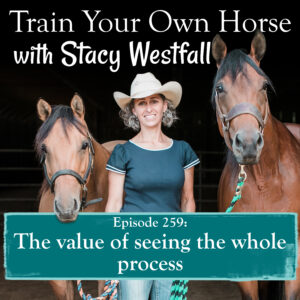Episode 259: The value of seeing the whole process
November 1, 2023/

In this episode, you’ll have the opportunity to experience a glimpse behind the scenes into the lives and journey of two students inside the Resourceful Rider program.
Through these heartfelt conversations, you’ll gain insight into their personal journeys. They’ll share their stories of overcoming challenges, celebrating successes, and experiencing life-changing moments that have shaped their paths.
Topics include:
- Feeling like you might not be ready
- Linear vs 3D training plans
- The setbacks that come when ‘leveling up’
- Retraining the frustration response
- Not viewing the horse as being defiant
- Self evaluation to improve feel and timing
- Non-judgmental learning
This episode is filled with wisdom and inspiration, and by the end, you’ll see how it was possible for them…and it’s possible for you too. Let’s get started!
2 Comments
Leave a Comment
SUBSCRIBE TO THE PODCAST HERE:





YOURS FREE
WHY IS MY HORSE...?


Question…I signed up last January (ish) for the Resourceful Rider program and want to continue. I’m wondering if there is a recurrent fee for 2024? Is it the same? Are there additional programs I should know about?
You don’t have to do anything, you have lifetime access and there is no additional fee!
I do have two other programs that you’ll start hearing about soon. I’ll contact past participants first, and then Resourceful Riders (like you!) next before I publish information publicly. You’ll get an email around the end of the month with more information.